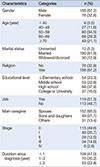Abstract
Purpose
This study was to develop a valid and reliable self-care performance scale for stomach cancer patients with gastrectomies.
Methods
The initial items for the self-care performance scale were derived by a literature review and in-depth interviews with stomach cancer patients with gastrectomies and a conceptual framework based on Orem's theory was used. The identified items were evaluated for content validity by experts. The main survey with refined items was performed with a sample of 232 patients. The data were analyzed using item analysis, Pearson correlation coefficients, Cronbach's alpha and factor analysis.
Results
A 22 item instrument with 7 factors was developed and the total variance explained was 66.9%. The factors were 'manage dietary restriction', 'avoid hazards', 'rest and elimination', 'manage social support and stress', 'regulation diet', 'meal portion control' and 'seek information and follow-up care'. The internal consistency, Cronbach's alpha was .86 and reliability of the subscale ranged from .65 to .82.
Figures and Tables
Table 1
Socio-demographic and Clinical Characteristics of Participants (N=232)

Table 2
Results of Factor Analyses

Table 3
Correlation of Factors

Table 4
Internal Consistency of Developmental Instrument

References
1. National Cancer Information Center. Accessed December 6, 2013. http://www.cancer.go.kr.
2. Oh PJ, Choi HJ. The effect of patient education interventions on distress, self-care knowledge and self-care behavior of oncology patients: a meta-analysis. Asian Oncol Nurs. 2012; 12(4):257–266.

3. Choi JY, Yang JJ. Effect of a multidisciplinary and individualized educational program on the need for caring among patients with cancer under radiotherapy. J Korean Oncol Nurs. 2008; 8(1):17–23.
4. Jeong HY, Kwon MS. The effects on self-care knowledge and performance in the individualized education for chemotherapy. J Korean Oncol Nurs. 2008; 8(1):8–16.
5. Kim JH. A model for medication adherence in cancer patients receiving oral chemotherapy [dissertation]. Seoul: Chung-ang Univ.;2012.
6. Davis-Evans C. Alleviating anxiety and preventing panic attacks in the surgical patient. AORN J. 2013; 97(3):354–364.

7. Kim MY. Development and effects of a web-based self-efficacy promoting program on stomach cancer patients with gastrectomy [dissertation]. Busan: Kosin Univ.;2008.
8. Song GY. Cognitive perception, self care and quality of life in gastrectomy patients with early gastric cancer [master's thesis]. Seoul: Yonsei Univ.;2009.
9. Orem DE. Nursing: Concepts of practice(5th ed.). St. Louis: Mosby;1995.
10. Lee HM, Shin YD, Yoon C, Joo HZ. A study on the quality of life following after curative surgery for gastric sancer. Ann Surg Treat Res. 2013; 60(4):405–411.
11. Park YO, Yoon SY, Kang SS, Han SM, Kang EH. Nutritional status and dietary change after gastrectomy of gastric cancer patients. Korean J Community Nutr. 2012; 17(1):101–108.

12. Na IJ, Lee BS. The effect of a telephone follow-up on the self-care and the satisfaction on nursing care in G-I surgical patients. J Korean Acad Nurs Adm. 1999; 5(2):355–367.
13. Yang BH. Understanding & application of multivariate data analysis. Seoul: Hakjisa;2009.
14. Lee EO, Lim NY, Park HA, Lee IS, Kim JY, Bae JY, et al. Nursing study and statistical analysis. Paju: Sumoonsa;2009.
15. Devellis RF. Scale development; theory and application second edition(applied social research methods). Thousand Oaks: SAGE Publications;2003.
16. Aaronson NK, Ahmedzai S, Bergman B, Bullinger M, Cull A, Duez NJ. The European organization for research and treatment of cancer QLQ-C30: a quality-of life instrument for use in international clinical trials in oncology. J Natl Cancer Inst. 1993; 85:365–376.

17. Vickery CW, Blazeby JM, Conroy T, Arraras J, Sezer O, Koller M, et al. Development of an EORTC disease-specific quality of life module for use in patients with gastric cancer. Eur J Cancer. 2001; 1(37):966–971.

18. Lee JH. Quality of life for the gastric cancer patients after gastrectomy : reliability and validity study of the korean version of the EORTC QLQ C-30 and gastric cancer module [master's thesis]. Seoul: Yonsei Univ.;2003.
19. Kline P. A handbook of test construction: introduction to psychometric design. New York: Methun;1986.
20. Lee IS, Park YS, Song MS, Lee EO, Kim HS, Park YH, et al. A study on the development of the korean family resilience scale. J Korean Acad Nurs. 2002; 32(4):560–569.

21. Kim SG. Relationships between self-efficacy, self-care behavior and quality of llife in patients with hematologic malignancy [master's thesis]. Busan: Kosin Univ.;2013.
22. Yoon IH. A study on the relationship among quality of life, self-efficacy and self care of open heart surgery patients after hospital discharge [master's thesis]. Gangneung: Kwandong Univ.;2005.
23. An HJ. A study of the quality of life in patients with breast cancer operations [master's thesis]. Seoul: Hanyang Univ.;2005.
24. Kang BS, Kim GS. pss 17.0 social science statistical analysis. Seoul: Hannarae Academy;2009.




 PDF
PDF ePub
ePub Citation
Citation Print
Print


 XML Download
XML Download